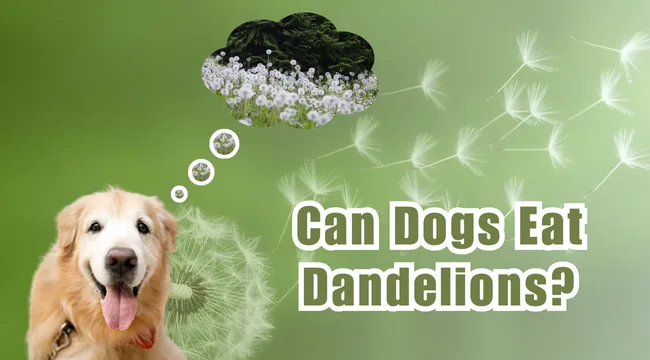
If you’re a dog owner who enjoys outdoor walks, you’ve probably seen your dog sniffing or even nibbling on dandelions. It’s a common question many pet owners have: Can dogs eat dandelions? Since dandelions are so common in the spring and summer, it’s understandable that you might wonder about their safety.
In this article, we’ll explore whether dandelions are safe for dogs, their health benefits, and what precautions to keep in mind if you choose to let your dog snack on them. Let’s take a closer look at this everyday plant and find out if it’s a good addition to your dog’s diet.
Table of Contents
- Are Dandelions Safe for Dogs?
- Nutritional Benefits of Dandelions for Dogs
- Potential Risks of Feeding Dandelions to Dogs
- How to Safely Introduce Dandelions into Your Dog’s Diet
- Conclusion
- FAQs.
Are Dandelions Safe for Dogs?
The Short Answer: Yes!
Dandelions (Taraxacum officinale) are safe for dogs to eat in moderate amounts. All parts of the plant, including the leaves, flowers, and roots, are non-toxic to dogs. This means that, unlike many other plants, dandelions won’t harm your furry friend if they decide to nibble on one.
However, as with anything new in a dog’s diet, it’s essential to proceed with caution and moderation. While dandelions are not toxic, the way they are grown or prepared can influence how they affect your dog.

Why Dogs Like Dandelions
Dogs are naturally curious, and many love to nibble on plants they find during their outdoor adventures. Dandelions, with their unique taste and texture, can be quite tempting for some dogs. Plus, they’re often found in grassy spots where dogs enjoy exploring, making them an easy snack.
However, before you let your dog munch on dandelions, it’s important to think about where they’re growing. Dandelions in your garden are likely safe if you haven’t used any chemicals. But those found in public parks or other areas might have been treated with pesticides or fertilizers, which can be harmful to your dog. So, it’s best to keep your dog away from dandelions in places where chemicals may have been used.
Nutritional Benefits of Dandelions for Dogs
While dandelions may seem like a humble weed, they are packed with nutritional benefits that can support your dog’s overall health. Let’s break down what’s inside these sunny little flowers:
1. Rich in Vitamins
Dandelions are an excellent source of several essential vitamins, including:
- Vitamin A: Promotes healthy vision, a strong immune system, and proper skin health.
- Vitamin C: Acts as an antioxidant, supports the immune system, and helps with tissue repair.
- Vitamin K: Essential for blood clotting and bone health.
2. Packed with Minerals
Dandelions also contain valuable minerals like:
- Calcium: A vital mineral for strong bones and teeth.
- Potassium: Supports healthy heart and kidney function.
- Iron: Aids in the production of red blood cells and helps prevent anemia.
3. Digestive Aid
Dandelions are high in fiber, which can be beneficial for digestion. They help promote a healthy gut by acting as a gentle laxative and supporting overall digestive function. If your dog suffers from occasional constipation, a small amount of dandelion may help keep things moving.
4. Antioxidant Properties
Dandelions are rich in antioxidants, which help to fight off harmful free radicals in the body. Antioxidants support your dog’s immune system, keeping them healthy and energetic.
5. Liver Health
Dandelions are also known for their potential liver-supporting benefits. They contain compounds that help detoxify the liver and improve its function. If your dog struggles with liver issues, consult your veterinarian before adding dandelions to their diet, but they may provide a natural way to support liver health.
Potential Risks of Feeding Dandelions to Dogs
While dandelions have many health benefits, there are a few risks to keep in mind before adding them to your dog’s diet.
1. Exposure to Pesticides
One of the primary concerns with dandelions is the potential for pesticide exposure. Dandelions that grow in public spaces or areas that are regularly treated with chemicals may contain harmful pesticides or herbicides that could be toxic to your dog. Always ensure that the dandelions your dog eats are grown in pesticide-free areas.
2. Overconsumption
Like any plant, dandelions should be fed in moderation. While they are non-toxic, excessive consumption may lead to gastrointestinal issues such as vomiting or diarrhea. If you’re introducing dandelions to your dog’s diet for the first time, start with a small amount and monitor them for any adverse reactions.
3. Allergic Reactions
Although rare, some dogs may be allergic to dandelions or other plants in the Asteraceae family, which includes daisies, sunflowers, and chrysanthemums. If your dog shows signs of an allergic reaction—such as itching, swelling, or difficulty breathing—after consuming dandelions, contact your vet immediately.
4. Risk of Stomach Upset
Dogs with sensitive stomachs may experience mild gastrointestinal upset from eating dandelions, especially if they are not used to consuming plants. If your dog has a history of stomach issues, it’s best to consult with your veterinarian before offering dandelions.
How to Safely Introduce Dandelions into Your Dog’s Diet
If you decide that dandelions could be a healthy addition to your dog’s diet, it’s important to introduce them gradually and ensure they are prepared safely.
1. Choose the Right Dandelions
Only allow your dog to eat dandelions from areas you know are free of pesticides and chemicals. Your backyard may be a good place to start, as you can control what goes into your garden. Avoid dandelions from public parks or roadsides, as they may have been exposed to harmful substances.
2. Wash Thoroughly
Before offering dandelions to your dog, make sure to wash them thoroughly to remove any dirt, pesticides, or harmful bacteria. This is especially important if you’ve gathered them from outside.
3. Start Small
When introducing dandelions to your dog’s diet, start with a small amount to see how they react. A few leaves or a small flower is a good starting point. Gradually increase the amount over time if your dog tolerates them well.
4. Watch for Reactions
Keep an eye on your dog after they eat dandelions. Look for any signs of digestive upset, such as diarrhea or vomiting, and ensure they don’t have any allergic reactions. If everything goes smoothly, you can continue offering dandelions as an occasional treat.
5. Prepare Them in Different Ways
Dandelions can be fed to dogs in a variety of ways:
- Fresh: Simply wash the dandelions and serve them raw.
- Dried: Dandelions can be dried and crumbled into your dog’s food.
- In Tea: Steep dandelions in hot water to make a calming herbal tea for your dog. Be sure the tea has cooled before serving it to your dog.
- Tinctures or Supplements: Some pet owners choose to use dandelion tinctures or dog-specific herbal supplements that contain dandelion extract. These are available from pet stores or online.
Conclusion
Dandelions may be a common garden plant, but they pack a punch when it comes to health benefits for dogs. Packed with vitamins, minerals, and antioxidants, dandelions can support your dog’s digestion, liver health, and immune system. However, like anything new, they should be introduced gradually and in moderation.
Always ensure that the dandelions your dog eats are pesticide-free, and monitor for any signs of allergic reactions or digestive upset. If you’re ever in doubt, consult with your veterinarian before offering dandelions as a treat.
So next time you see your dog sniffing around a dandelion, you can rest easy knowing that this sunny little flower is a safe and nutritious snack—just be sure to keep things in moderation. Your dog may just love it!
FAQs.
Can Dogs Eat Dandelions Every Day?
While dandelions are safe for dogs to eat, they should be offered in moderation. You don’t need to give your dog dandelions every day, but they can make a healthy, occasional treat. Just be sure to watch your dog for any signs of stomach upset, and don’t overdo it.
Are There Any Side Effects of Dandelions in Dogs?
In general, dandelions are safe for dogs, but overconsumption can lead to gastrointestinal issues. Dogs that eat too many dandelions may experience diarrhea or an upset stomach. If your dog has any known sensitivities to plants, it’s best to consult with your vet before introducing dandelions into their diet.
Can Dandelions Help My Dog’s Liver?
Dandelions are known to support liver health in both humans and dogs. The plant contains compounds that help detoxify the liver and improve its function. If your dog has liver problems, it’s a good idea to speak to your vet before giving them dandelions as a supplement.
Can Puppies Eat Dandelions?
Yes, puppies can eat dandelions in moderation. As with adult dogs, be cautious about overfeeding and ensure the dandelions are free of harmful chemicals. Start with small amounts to avoid upsetting their stomachs.



